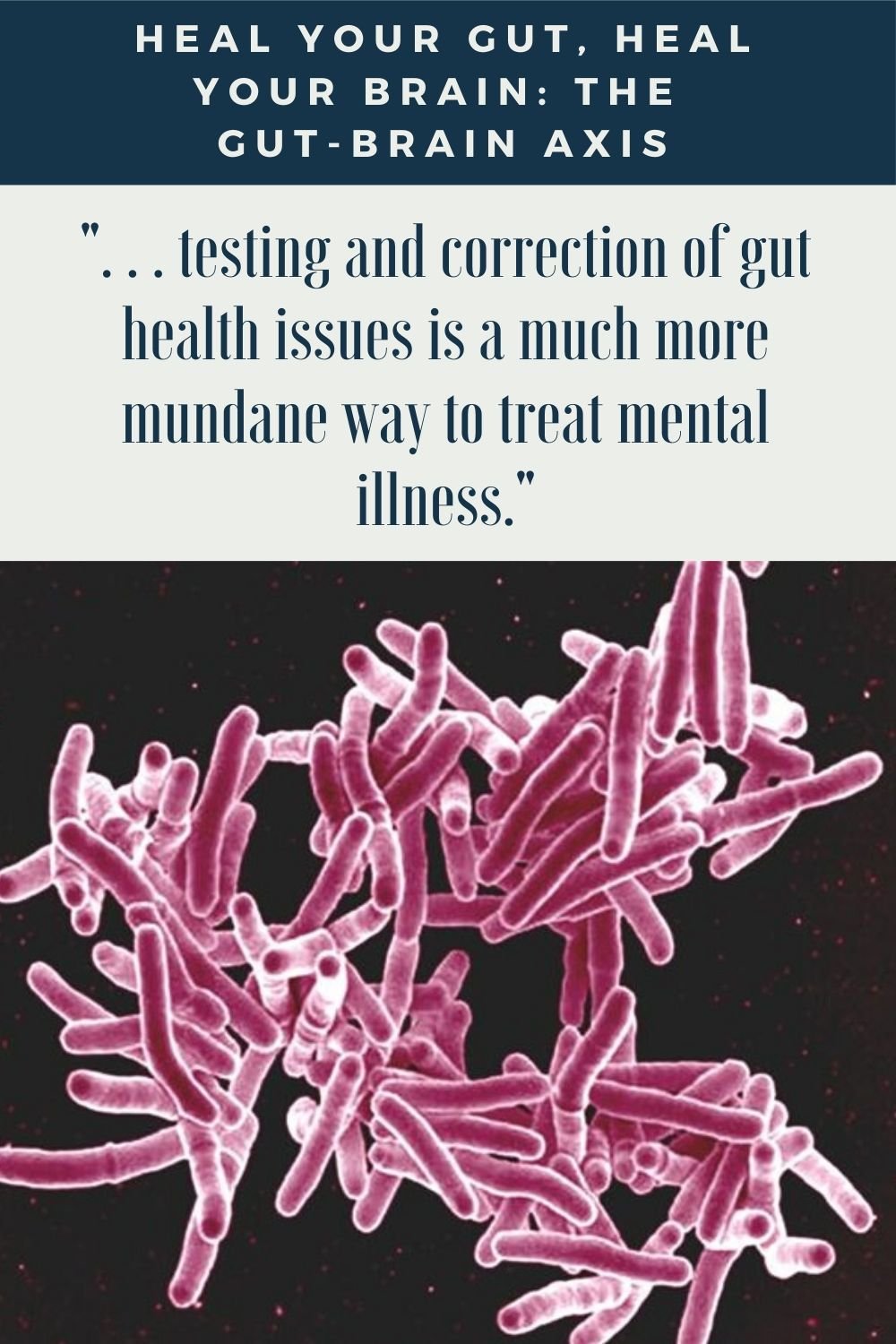 I’m sure that you’ve all heard about the gut-brain axis and how your gut health impacts your mental health. A 2017 review of the peer-reviewed medical literature on this axis by Clapp et al. concluded: “This review demonstrates the importance of a healthy microbiome, particularly the gut microbiota, for patients suffering from anxiety and depression, as dysbiosis and inflammation in the CNS [Central Nervous System] have been linked as potential causes of mental illness. Of note, studies have shown that probiotics effectively mitigated anxiety and depressive symptoms similar to conventional prescription medications.”
I’m sure that you’ve all heard about the gut-brain axis and how your gut health impacts your mental health. A 2017 review of the peer-reviewed medical literature on this axis by Clapp et al. concluded: “This review demonstrates the importance of a healthy microbiome, particularly the gut microbiota, for patients suffering from anxiety and depression, as dysbiosis and inflammation in the CNS [Central Nervous System] have been linked as potential causes of mental illness. Of note, studies have shown that probiotics effectively mitigated anxiety and depressive symptoms similar to conventional prescription medications.”
In my practice, I have often noted that clients with gut infections and dysbiosis (abnormal overgrowth of certain bacteria or fungi) also have diagnoses of anxiety and depression. While I agree that probiotics can be helpful, it’s important to heal gut infections before wasting money on probiotics.
In my latest podcast episode, I interviewed Mary, a mom from California who sought out FMT or fecal microbiota transplants (aka poop transplants) for her children’s urgent health problems at a clinic in Australia (because it’s not legal here for their conditions). Her daughter had severe social anxiety and auditory and tactile hallucinations diagnosed as something called PANDAS (pediatric autoimmune neuropsychiatric disorders associated with streptococcus) and her son had autism and lifelong diarrhea. By the end of 3 weeks of transplants, the clinic determined through testing that her third child was a safe donor to continue the transplants once home.
That’s where it gets interesting on the topic of anxiety and depression. Mary had been suffering with both her entire life, and the anxiety had become quite severe to the point where she was having panic attacks every time she contemplated driving, which was a daily necessity. So Mary gave herself 10 fecal transplants over the course of 15 days using her daughter’s stool. Her symptoms of anxiety and depression were gone after the first two fecal transplants, and haven’t returned since. And her daughter’s condition was also gone after two weeks of transplants plus supplemental FMTs after returning, as well as her son’s diarrhea.
Mary’s story is amazing but not shocking given that we know that gut bacteria produce and/or consume a wide range of our neurotransmitters, including dopamine, norepinephrine, serotonin and gamma-aminobutyric acid (GABA). In fact, 95% of the body’s serotonin is found in the bowels. While Mary’s solution may be a bit extreme for most people (not to mention costly given the testing and the trip to Australia that gave her the confidence to try FMT at home), testing and correction of gut health issues is a much more mundane way to treat mental illness.
Various functional lab tests that consumers can order themselves can shed light on what’s going on in your gut that may be affecting your brain. These include the Organic Acids Test, which includes over 70 metabolic markers of gut health, vitamin levels, neurotransmitters, mitochondrial function and much more and Onegevity’s Gutbio test, which is a complete metagenomic sequencing of your gut microbiome down to the strain level, including parasites, bacteria, archaea, fungi and viruses. Stocked with this information, I educate my clients on protocols recommended by MDs and PharmDs to heal/treat the dysbiosis (usually through herbal antimicrobials + probiotics), which can help correct neurotransmitter issues impacting mental health.
If you’ve only sought out allopathic (aka traditional) doctors or therapists to help with your mental health issues without relief, it may be a gut problem! I encourage you to listen to Mary’s family’s amazing healing story! (Or if you’re not podcast-listening savvy just find it here on my web site.)
If you’re suffering from mental illness and traditional routes have not yet brought you relief, I offer free, 1-hour Health Restoration Breakthrough Sessions to share about your struggles and learn how health coaching with me could help.

